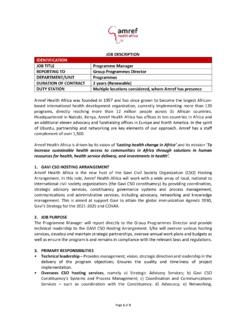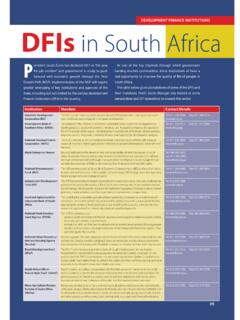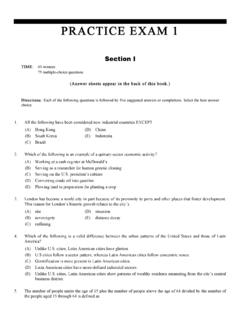Transcription of Doing business in Zimbabwe - Grant Thornton Zimbabwe
1 1 Doing business in Zimbabwe 2013/2014 2 Content Page Content 2 Foreword 3 Country profile 4 The Zimbabwean environment 5 Investment opportunities 5 Banking and finance 10 Setting up a business in Zimbabwe 11 Exchange control regulations 13 Taxation 14 Labour 15 Our contact details 16 Reggie Saruchera, Managing Partner Grant Thornton Zimbabwe In today's competitive business environment efficient tax planning requires not only bright ideas and intelligent planning, but also a commitment to professional excellence and a complementary service approach. 3 Foreword Grant Thornton is one of the world s leading organisations of independent assurance, tax and advisory firms. These firms help dynamic organisations unlock their potential for growth by providing meaningful, forward looking advice.
2 Proactive teams, led by approachable partners in these firms, use insights, experience and instinct to understand complex issues for privately owned, publicly listed and public sector clients and help them to find solutions. More than 35,000 Grant Thornton people, across over 100 countries, are focused on making a difference to clients, colleagues and the communities in which we live and work. If you require any further information, please do not hesitate to contact your nearest Grant Thornton member firm. This guide has been prepared for the assistance of those interested in Doing business in Zimbabwe . It does not cover the subject exhaustively but is intended to answer some of the important, broad questions that may arise. When specific problems occur in practice, it will often be necessary to refer to the laws and regulations of Zimbabwe and to obtain appropriate accounting and legal advice.
3 This guide contains only brief notes and includes legislation in force as of 2013 to 2014 Grant Thornton refers to the brand under which the Grant Thornton member firms provide assurance, tax and advisory services to their clients and/or refers to one or more member firms, as the context requires. Grant Thornton International Ltd (GTIL) and the member firms are not a worldwide partnership. GTIL and each member firm is a separate legal entity. Services are delivered by the member firms. GTIL does not provide services to clients. GTIL and its member firms are not agents of, and do not obligate one another and are not liable for one another s acts or omissions. At Grant Thornton we recognise the importance of using both reason and instinct to helpyou make the right business decisions. 4 Country profile Fast facts about Zimbabwe Basic data Population million (2012 population census) Area 390 580km2 386 493km(land) 4 087km water GDP (purchasing power parity) US$ billion (2012 est.)
4 GDP per capita (PPP) US$600 (2012 est.) Exports US$ billion (2012 est.) Platinum, gold, diamond, tobacco and cotton. Imports US$ billion (2012 est.) Private vehicles, basic commodities, machinery, fuel, electrical goods, IT. Literacy rate 92% Government type Parliamentary democracy Life expectancy Male: years female: years (2013 est.) Urban population of total population Local currency Multi-currency mostly the United States Dollar Language English (official), Shona, Ndebele) and other numerous but minor tribal dialects. business hours to Employment levels Above 80% 2 5 Zimbabwean business environment Zimbabwe has been under the administration of a Government of National Unity ( GNU ) since February 2009. Although this government arrangement has brought with it some relative political and economic stability, it has been dogged by alleged differences and disagreements among the coalition partners - a scenario that has continued to give the country a perception of high political risk.
5 The GNU ended after a general election that was held on the 31st of July 2013, which resulted in ZANU PF winning and therefore taking control of the government of Zimbabwe . Zimbabwe s inflation rate has generally remained below the 5% mark over the past three years and compares favourably with regional trends. Going forward, inflationary pressures are more likely to come from wage demands (both from the public and private sectors) driven by food and rental costs. It is also important to note that the Zimbabwean economy is still susceptible to both demand pull and cost push inflation due to various factors whose roots are in the weak productive capacity of the economic system, compounded by liquidity challenges and lack of freely flowing capital, making the country a net importer of goods and services. The introduction of a multi-currency system effectively ended the use of the Zimbabwean dollar as a medium of exchange.
6 The main currency in use is the USD, with the South African Rand (ZAR) being the second mostly used currency. The GBP, Botswana Pula and Euro are also legal tender, although they are used to a lesser extent than the USD and ZAR. The government, through the Ministry of Finance has indicated that the multi- currency regime will remain in place in the foreseeable future. Investment Opportunities The Government has put in measures and incentives to attract foreign investment in several sectors of the economy. To protect investors coming to Zimbabwe the country is a signatory to bilateral protection agreements with several countries: the Multilateral Investments Guarantee Agency, the Overseas Private Investment Corporation, and the United Nations Convention on International Trade Law and the New York Convention on enforcement of Foreign Arbitral Awards. Zimbabwe is also a member to the following organisations, which enables better access to global markets: Common Market for East and Southern Africa ( COMESA SADCC ACP (EU/Convention) General Systems of Preferences World Trade Organisation The PoliticsInflation TrendsCurrency 6 World Intellectual Property Organisation African Regional Intellectual Property Organisation.)
7 Mining sector Approximately 60% of Zimbabwe s land surface comprises of ancient rocks renowned worldwide for containing rich varieties of mineral resources including gold, base minerals (copper, zinc and lead) and industrial minerals (limestone, phosphates, clay and dolomites). The mining industry is largely governed by the Mines and Minerals Act although it is subject to other regulations like any other business in Zimbabwe . The mining industry falls under Ministry of Mines. Other laws include: Mineral Marketing Corporation of Zimbabwe Act Gold Trade Act Precious Stones Trade Act Base Minerals Export Control Act The Chamber of Mines of Zimbabwe (established by an Act of parliament) is the dominant representative body of the mining industry in Zimbabwe . The Mines and Minerals Act also establishes the Mining Affairs Board which oversees the administration of the Mines and Minerals Act from an administrative perspective.
8 The Zimbabwe Mining Development Corporation (a parastatal) is the government body responsible for mining and mining development Gold Diamonds Platinum Coal Chrome Iron ore Key mineral resourcesIndustry bodiesGoverning laws 7 Infrastructure sector The government has prioritised investment in infrastructure as part of the critical path to the recovery of the Zimbabwe economy. Over the last few years, there had been low investment in infrastructure by both the government and private players. The net effect of this disinvestment has been a collapse of road and railway infrastructure and an erratic power sector that is not able to provide more than 60% of the national peak demand,. Out-dated information communication technology ( ICT ) places Zimbabwe behind regional standards in the area of fibre optic network and new generation ICT. In recent times, government has earmarked ten (10) of its seventy-six (76) state enterprises and parastatals for privatisation, commercialisation or restructuring.
9 The earmarked state enterprises and parastatals include: Cold Storage Company (beef producer and exporter) ; Air Zimbabwe (national airline) TelOne (fixed line operator) NetOne Cellular (Private) Limited (GSM operator) Agriculture Development Bank of Zimbabwe (registered commercial bank) Allied Timber Holdings (Private) Limited (timber company which focuses on the management of forests and operation of saw mills) Zimbabwe Institute of Personnel Management (responsible for designing and implementing training, consultancy and research for the civil service, local authorities and parastatals) National Railways of Zimbabwe (country s railway services company) ZESA Holdings Limited (generator and distributor of electricity in Zimbabwe ) Zimbabwe Steel Company (steel manufacturer). Energy sector With considerable hydroelectric power potential and abundant coal deposits for thermal power stations, Zimbabwe is less dependent on oil as an energy source than most other comparably industrialised countries, but it still imports 40% of its electric power needs from surrounding countries - primarily Mozambique.
10 Only about 15% of Zimbabwe s total energy consumption is accounted for by oil, all of which is imported. Zimbabwe imports approximately billion litres of oil per year. Zimbabwe also has substantial coal reserves that are utilised for power generation, and coal-bed methane deposits that were discovered in the Matabeleland province. These deposits are greater than any known natural gas field in Southern or Eastern Africa. Zimbabwe has been unable to meet its energy requirements from its current electricity generation capacity and needs to expand and upgrade its electricity generation and transmission infrastructure against the background of the SADC regional power deficit. The following projects which require funding have been lined up to develop the energy sector in Zimbabwe : 8 Completion of stage one of the rehabilitation of Hwange Power Station The expansion and generation of capacity at Kariba South Tokwe Mukosi Dam Construction Gokwe North Power Station.





